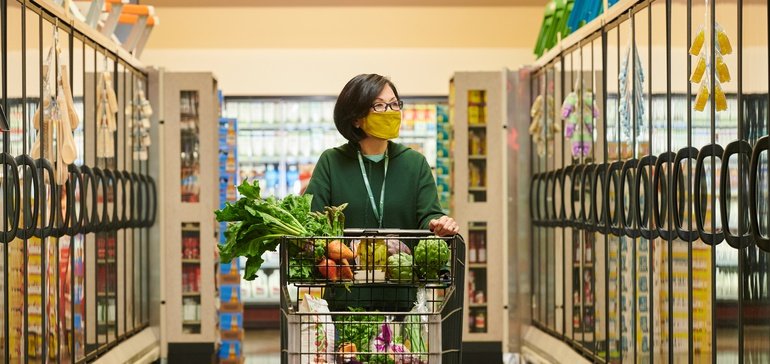Consumers favor frozen foods as shelf life, price concerns grow, survey finds

Dive Brief:
- Frozen foods are growing in popularity as consumers notice price increases and grow concerned about fresh food spoilage, according to a recent report by Deloitte. In a July 2021 survey of 2,000 adults, 65% said the prices of fresh foods have risen recently, up 8 points from Deloitte’s 2020 survey. And 82% said prices on fresh options have increased more than is justified. Meanwhile, almost half of consumers thought the price of frozen food hadn’t gone up at all.
- Concern about the shelf life of products is another major influence on shopper habits. In the survey, nearly half (45%) said more of the fresh food in their home goes to waste now than it did in the past as the frequency of shopping trips remains below pre-pandemic levels.
- Frozen foods, which enjoyed a sales bump early in the pandemic as consumers looked to stock up while they were stuck at home, are now seeing tailwinds from their perceived lower perishability, better pricing and a growing number of premium options, which presents opportunities for manufacturers to innovate.
Dive Insight:
Whereas convenience was a key driver for frozen foods early in the pandemic, perishability is rising in importance in 2021 — for more reasons than one.
The frequency of grocery trips is down 8 percentage points relative to 2019, according to Deloitte. Meanwhile, supply-chain breakdowns have increased the amount of time products are in transit and storage before they reach shelves, further heightening consumers’ concerns around the perishability of foods. In the Deloitte survey, 60% of shoppers thought the shelf life of fresh foods has decreased.
Consumers are also more mindful of food waste. More than 7 in 10 said they thought about how much food they throw away when making a purchase decision. This — combined with frozen foods’ perceived cheaper pricing, convenience and nutritional value — is set to keep these options in consumers’ carts this year.
However, Deloitte also found that “eating fresh is an identity and lifestyle” that does not translate to frozen food. In the company’s research, 90% of consumers say eating fresh food makes them happy whereas only 40% say the same about frozen. The emotions attached to fresh food were such that three-quarters (78%) of shoppers said they were willing to pay a premium for fresh food.
This seeming contradiction between the sales growth of frozen food and consumers’ continued preference for fresh options means manufacturers have the opportunity to innovate as a means to close this gap.
“Suppliers and retailers should also consider leaning into the opportunity in frozen by expanding their product offerings and reimagining the frozen aisle to create excitement and even more growth,” Deloitte’s consumer products leader Barb Renner said in a statement.
Frozen options have particularly resonated with younger shoppers thanks to changes made by manufacturers in the versatility, quality and healthfulness of frozen substitutes, according to Deloitte. In the firm’s findings, 57% of those 18 to 34 years old believe frozen vegetables are just as good or better than fresh, compared to 39% of those 55 and older. Over half of young people believe that frozen meat, fruits and berries are just as good or better due to the ability to preserve vitamins and nutrients through freezing.
Already, brands from manufacturers such as Nestlé, B&G Foods, Conagra, Mars and General Mills have been focusing on healthful offerings and clean label ingredients as a means of attracting consumer attention in what is increasingly becoming a crowded and competitive freezer space.
Source: fooddive.com

